The first post in the series, Genealogy Search Engines - Ancestry.com's Old Search, Exact Matches discussed how Ancestry.com satisfied the four evaluation criteria.
This post demonstrates finding the Isaac Seaver (born 1823 in Massachusetts) family in the 1860 US census using Ancestry.com's New Search user interface with Fuzzy Matches (meaning the data in the Search parameters may not be "Exact").
We start on the New Search Home page with the information filled in the search boxes (First Name, Surname, Year, Birthplace) and the Exact Matches box unchecked:
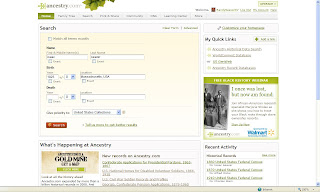
Clicking on the "Search" button (Click 1) results in this screen:
The screen indicates that that there are 136,715 matches for my Search parameters. Wow. Who knew? I'm specifically looking for the 1860 US census, and it is not on the list shown. If I click on the "See all 17,865 results" then I should be able to find the 1960 US Census results. I click on it (click 2) and see:
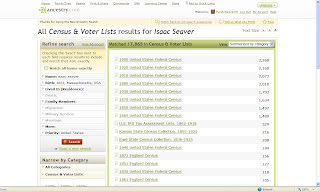
Yep, there it is with 1,480 matches. That's still a lot. Will my Isaac Seaver be near the top of the list? The 1860 US Census is the 9th on the list, which is in order of number of matches. I clicked on the 1860 US Census link (Click 3) and see:
The Search found four entries for an Isaac Seaver, and the other
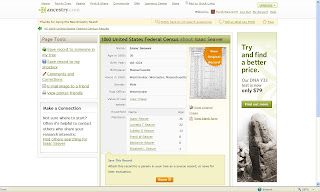
I can scroll down to see the bottom of the screen in order to see the source citation:
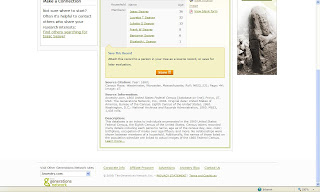
To see the image of the actual census page, I click on the "View original image" link (Click 5) and see the census page:
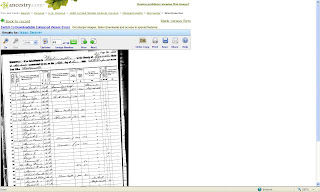
The first match on the list above is highlighted with a green background, and has four stars. The other three Isaac Seaver entries have a different background color and number of stars (three and a half for some reason!), meaning they aren't a great match for my search parameters. There are another 1,476 matches with fewer stars and the Search interface kindly says:
"Matches below are less likely to be for your ancestor, but still might be helpful. Names, dates, and locations on old records are often misspelled or different than you expect. Although you’ll find fewer relevant matches the further you go, some might be helpful because we look for misspellings, abbreviations, and other possible dates & locations.. "
I clicked on the "View Record" link next to the (Click #4) and this screen appeared:
I clicked on the "View Record" link next to the (Click #4) and this screen appeared:

I can scroll down to see the bottom of the screen in order to see the source citation:

To see the image of the actual census page, I click on the "View original image" link (Click 5) and see the census page:

Looking at my four evaluation questions, the answers are:
* Does the Search find the record I'm seeking? YES
* How many clicks does it take to find the record? Five (5), not counting the Search box addition.
* Does the record provide a source citation? YES
* Was the process easy to use? YES, except that the 1860 US census results were hidden on the first list of matches (after Click 1)
The New Search - Fuzzy Matches method used five clicks to get to the image, while the New Search - Exact Matches also used five clicks. The Old Search - Fuzzy Matches method used three clicks.
If I had wanted to change the search parameters at any point, I could have done so easily by clicking on the parameter name in the Search box on the second or third screens.
If I had wanted to change the search parameters at any point, I could have done so easily by clicking on the parameter name in the Search box on the second or third screens.
One of the strengths of the Ancestry.com Search interface is the ability to change your Search parameters during the search itself - to add a parameter, to make parameters Exact, to add a range to the dates, etc. Inexperienced users need to learn these "tricks of the trade" through practice and example - which is one reason why I'm doing these exercises!


4 comments:
Hi Randy,
I nominated you for the Kreativ Blogger award! You can pick it up at http://www.ataleoftwoancestors.blogspot.com:-)
Thanks so much Randy for doing these search comparisons. They really help me to understand what is going on in the databases.
I do have one observation, though. You know that the information exists in the database when you start the search for these tests. In most cases a researcher is just hoping there is some information available on the person being searched. Choosing the most appropriate search, continuing through additional kinds of searches and persisting when you initially get no returns (or an overwhelming number) has to be learned behavior. I'm working on it.
Randy,
What a great series of tests!
Shortly after introducing New Search, Ancestry.com adding a setting that affects the result of your fuzzy test.
Old exact search always displayed results by category. Old ranked search always displayed results sorted by relevance. New Search was first released without the "results by category" option, which confused and infuriated old exact search users. So Ancestry.com responded to customer requests to add this option back in.
In the upper-right corner of the list of results is a "View" setting that can be set to "Summarized by category" or "Sorted by relevance." Ancestry.com gave users greater control by allowing either view to be used with either search method.
Viewing by category inherently adds an additional click. An argument can be made, that it makes no sense to use category summaries with ranked search results.
One aspect of Ancestry.com's New Search is that it blurs the distinction between exact and ranked searching. That begs the questions, does it ever make sense to view results by category rather than by how well the results match?
In my opinion, Ancestry.com added the option just to make a transition to New Search easier to old users. I believe it is one of several ways in which old exact search is inferior to new exact search.
-- The Ancestry Insider
Randy,
I have greatly enjoyed your breadth of interests.
Regarding this search, if looking for an 1860 US Federal Census entry, why are you using a global search page instead of the search page for the 1860 enumeration? It is easy as pie to bookmark the Census listings, much easier than specifying such a search via the homepage/global search. A lot faster loading, too.
Post a Comment